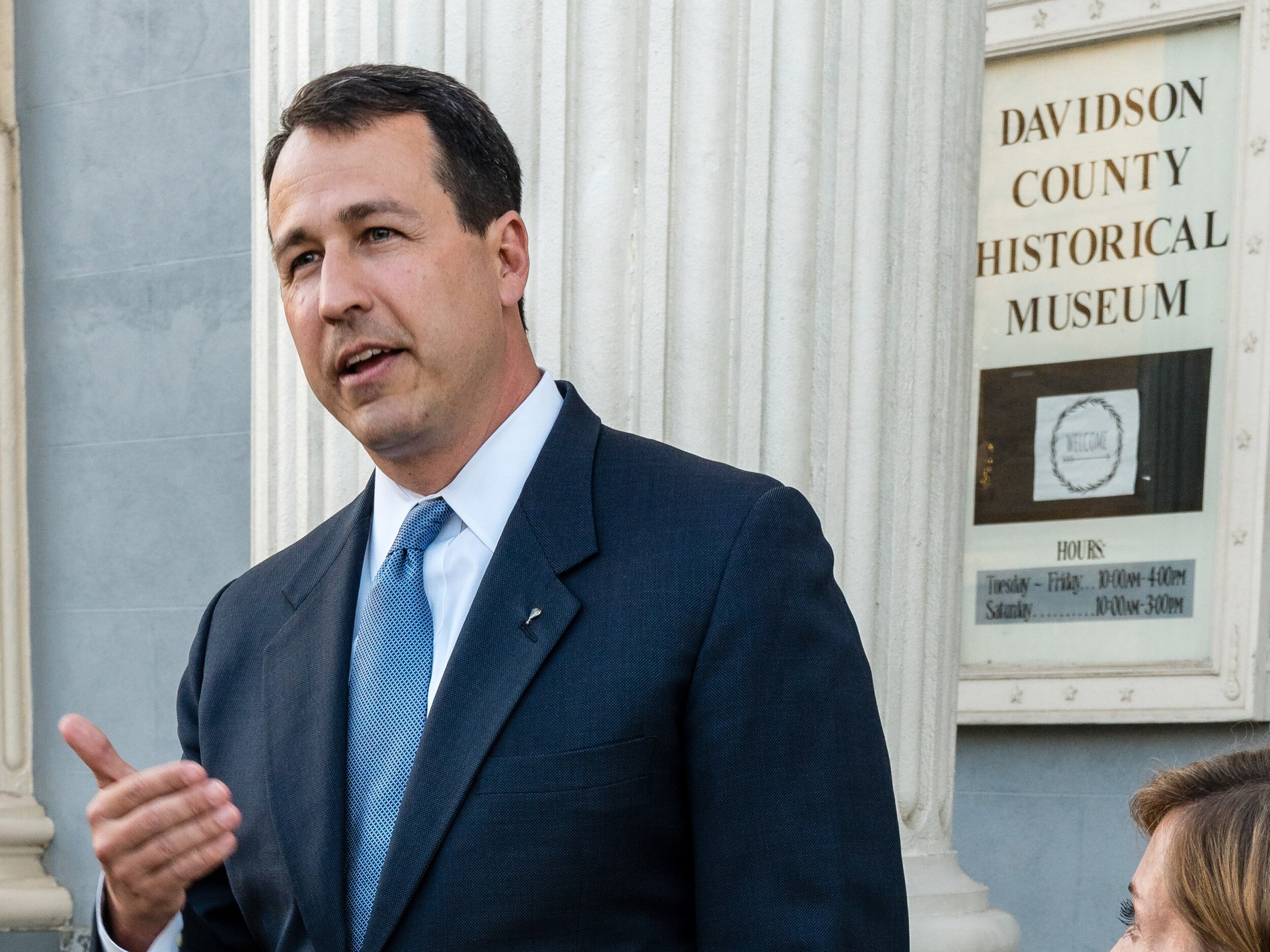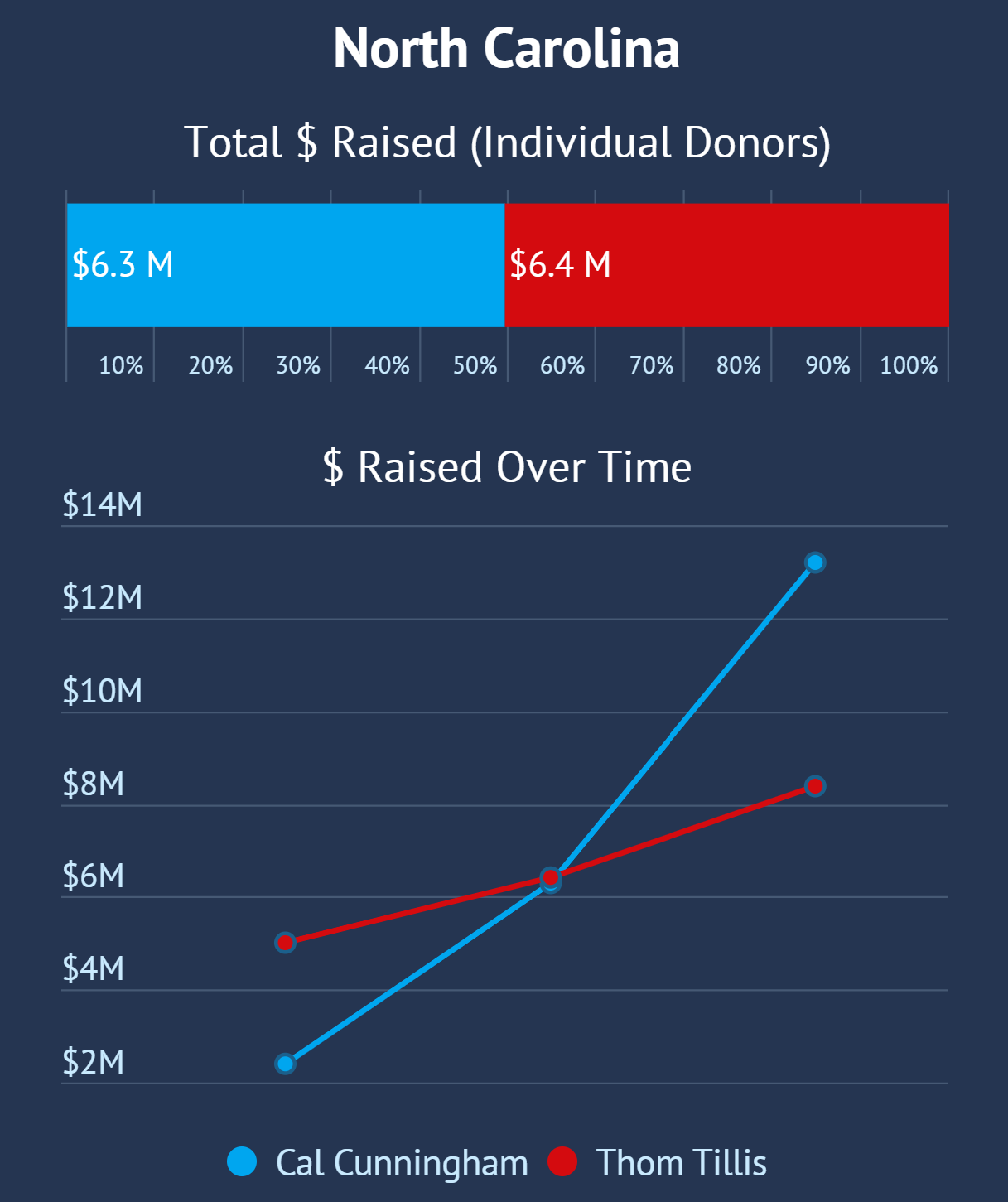Democrat Senate Prospects Rise on a Tsunami of Small Dollar Donors
Democrat State Senate Cal Cunningham has become the favorite in North Carolina after raising three times as much money from individual donors as Incumbent Republican Senator Thom Tillis - Photo credit: Graysonbarnette / CC BY-SA (https://creativecommons.org/licenses/by-sa/4.0)
By: Logan Phillips
Date: 7/25
In the latest sign that 2020 might be a wave election, Democrat candidates have been the beneficiaries of an historic surge in small-dollar donations. The most remarkable part of this hailstorm of grassroots enthusiasm is the sheer number of Democratic challengers whose fundraising has surpassed, or even dominated, their Republican opponents, even in races that almost no one considered on the map just a few months ago.
In Kentucky, Mitch McConnell, no slouch when it comes to raising money, has been completely outmatched by Amy McGrath’s financial pull, whose campaign raised over $40 million dollars. In South Carolina, Jamie Harrison has now surpassed Lindsey Graham in dollars raised by individual donors with $30 million.
Click here to see who has raised the most in each race
Photo Credit: Infogram, designed by Logan Phillips
The Kansas Senate Race may not be getting a significant amount of national attention, but under the radar State Senator Barbara Bollier has a truly breathtaking edge over both of her Republican opponents, in the suddenly quite competitive Kansas Senate race. Her campaign raised $7 million from individual donations, while her two most likely opponents, Kris Kobach and Roger Marshall, have raised merely $800k and $1.7 million, respectively, much of which they are burning through already, ahead of the Republican primary.
Their successes offer a two-pronged potential promise for Democrats’ chances of winning the 2020 Senate. First, an edge in fundraising assures a politician will have the resources to get their message out, and therein, opportunities to define their candidacies on their terms, rather than be defined by their opponents. Second, fundraising from individual donors are terrific indicators of which campaigns have more grassroots enthusiasm, stronger candidates, and more compelling messages.
That is why fundraising plays such a critical role in our Forecast for the Senate. In past election cycles, Candidates who significantly out fundraised their opponents, even in traditionally unfriendly states, performed much better than those that failed to do so, when all other components of the election are held equal. While a big bank account alone will rarely be enough to win for weak candidate in tough races, it can make a significant difference for skilled politicians, who possess a great profile, especially when they are facing an opponent with exploitable vulnerabilities.
Democrats have enjoyed great fundraising successes in almost every one of their top targeted races, especially in states like Iowa, Georgia and Arizona – the results of which you can keep up with yourself, by following the in-depth projections for each individual senate race, here.
The Democrats’ best news came from North Carolina, where through the end of last quarter, State Senator Cal Cunningham has been trailing the Republican Incumbent Senator Thom Tillis. However, in the last three months, Cunningham’s campaign has literally tripled Tillis in dollars raised – and this, over a sitting Senator. As a result, North Carolina has now shifted in our Forecast, from a Tossup to a Tilt Democrat, with Cunningham having a 67% chance of victory.
Photo Credit: Infogram, designed by Logan Phillips
We can, however, report two pieces of good news for the Republican party. First, Texas Senator John Cornyn continues to easily out-fundraise his Democratic opponent, M.J. Hegar, a significant development in a state as big as Texas. Despite Cornyn’s almost nine percent lead in the polls, this race has the potential to become more competitive; there are more undecided voters in TX, according to polling, than any other well-polled state in the nation. In a year in which traditional campaigning has been rendered impossible by the global pandemic, Democrat Nominee Hegar must narrow her financial disadvantage, if she hopes to effectively get her message out to persuadable Texans.
Photo Credit: Infogram, designed by Logan Phillips
Despite a large lead for Cornyn in Texas, the high number of undecided voters suggest Democrats have an outside shot. Click here for polling averages for every Senate race
The second point of good news for Republicans, is for U.S. Army veteran John James, in Michigan, who for the second straight quarter, outpaced the fundraising of Democrat incumbent Senator Gary Peters. As a talented candidate and army veteran with the chance to become the second Black Republican Senator since 1980, James presents the GOP with their second-best Senate pick-up opportunity, after Alabama. However, James will likely need to successfully differentiate his image from Trump without turning off too many of the President’s Supporters in order to escape a potential dragging under by Trump’s coattails, as Trump’s popularity has dropped significantly in Michigan more then any other state he won in 2016.
Finally, one of the most encouraging signs for Americans in the coming election, regardless of which side of the aisle they are on, is that campaigns are gaining a much higher percentage of financial support from more small-dollar donors, during the last two election cycles, than they have historically. Money has long had a corrosive impact on politics, especially since the U.S. Supreme Court struck down campaign finance regulations that limited political expenditures from corporations. The less politicians feel forced to rely on Super-PAC money and big donors’ dollars, in order to win re-election, the less influence a select few will have over our political system, and the more representative our democracy will be of the American electorate.



